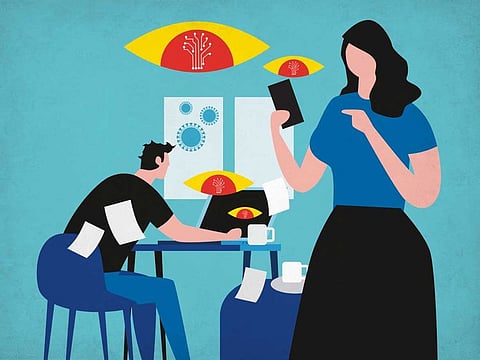COVID-19: Privacy in the time of coronavirus pandemic
Our intimate details are out there but the world faces an unprecedented situation

The uneven global response to the COVID-19 outbreak is a window into how governments are grappling with their monopoly on power.
But this is not about force or the use of violence. Rather, it is about the competing narratives on privacy in the age of smartphones.
Over the past two decades, technology companies mostly based in China and the United States have created a vast surveillance infrastructure based on smartphone use. It is primarily utilised as an engine for advertising. Regardless of its use, the smartphone is the ultimate vector through which data is collected.
Today, almost everyone has a smartphone. And they are creating a vast amount of information daily. From location data to search history to buying patterns to health records and more, people are walking generators of data. Our social class, background, age and nationality do not matter; we are all connected in the information we create. But there is a big caveat. Although we create the data, we do not necessarily have the means to access or use it.
We have the most powerful surveillance infrastructure ever created in history at our disposal. Used efficiently, it can track the spread of the virus and inform critical decisions about resource allocation to save lives.Joseph Dana
Private companies such as Google and sovereign nations such as China have the ability to transform the inchoate data into actionable intelligence. They have designed the algorithms and possess the computing power to turn our random streams of binary zeros and ones into useful material for advertisers, behavioural scientists and, too often, the apparatus of state security.
What does this have to do with the global spread of COVID-19? It’s remarkably simple. Since we all carry smartphones, it is easy to track our every movement and even to predict where we might be at almost any given time of the day, any day of the week. In trying to curb the spread of the virus, some countries have seized on this as a valuable tool. China’s robust response to the COVID-19 virus has included the use of its vast network to ensure that infected people report to state-operated medical facilities. China’s ability to contain the virus so quickly is widely credited to this surveillance.
Israel, on the other hand, likes to believe it is a Western-style democracy in the Middle East. Yet it has adopted very similar protocols to surveil infected people within its borders. Using a secret trove of cell phone data culled from its surveillance of Palestinians, Israel’s internet security agency has been tracking people with COVID-19 in an attempt to identify others who may have been infected and need to be quarantined — the technology is promiscuous and does not restrict its attention to just Palestinians.
Focus on surveillance technology
The news of this program and its current use shocked many Israelis, leading Prime Minister Benjamin Netanyahu to declare that Israel needed “to maintain the balance between the rights of the individual and the needs of general society.” The fact is, Israel has been refining and deploying this technology for years on Palestinians, both in the Occupied Territories and within Israel. Thus, the “shock” that many Israelis have declared rings a little false.
Be that as it may, COVID-19 raises important issues about surveillance technology. We have the most powerful surveillance infrastructure ever created in history at our disposal. Used efficiently, it can track the spread of the virus and inform critical decisions about resource allocation to save lives. But will people give governments around the world the power to deploy this powerful technology? And should they?
We have to acknowledge that many — even most — of us already grant this power of surveillance to companies like Facebook and Google. These companies do not answer to anyone but their shareholders. Google, for example, knows more about you than probably your spouse or your doctor. And as the myriad data privacy scandals over recent years have shown, these companies do not normally operate in your best interest.
That leads to a simple question: why do we willingly sign over to a Silicon Valley company with a bad track record on data privacy the most intimate details of our lives, but are wary of our own government during a pandemic of possibly historical proportions? There are ample reasons to fault government response to the COVID-19 outbreak, especially in countries like the United States and United Kingdom, but at this grave hour, we need to use every measure we have to combat this virus.
While it might sound frightening to grant governments more power over the intimate details of our lives, the world is facing an unprecedented situation. We have the tools to dramatically curb the spread of this virus. It is time to think out of the box because desperate times call for desperate measures. To be sure, we should reassess the ownership interest in our personal data. But that time would be after we have defeated the pandemic.
— Joseph Dana, based between South Africa and the Middle East, is editor-in-chief of emerge85, a lab that explores change in emerging markets and its global impact.
Sign up for the Daily Briefing
Get the latest news and updates straight to your inbox







